|
|
 |
 |
 |
 |
On Tuesday morning, participants convened to hear Andreas Schild, Director General, ICIMOD, provide a broad context for the mountain agenda and to reflect on the first day of the workshop.
Participants then attended a session on “Key learning, experiences and messages from the Asia-Pacific mountain regions” and split in working groups on: identification of issues and challenges in promoting a green economy in mountain regions; identification of the potentials and opportunities for sustainable mountain development in the context of the green economy; how to create enabling conditions for promoting green economy for sustainable mountain development; and identification of principles and actions that demand priority in the global green economy and Rio+20.
In the afternoon, participants listened to reflections from the representatives of other mountain regions of the world and a summary of recommendations emerging from the workshop. In the evening, they attended the opening of the Conference. During the opening ceremony, the Right Honourable President of the Republic of Nepal, Ram Baran Yadav, congratulated ICIMOD for organizing the workshop and urged for mountain issues to be included in the Rio+20 deliberations.
Visit the full web coverage for Tuesday 6 September 2011.
|
|
 |
 |
 |
 |
 |
 |
 |
 |
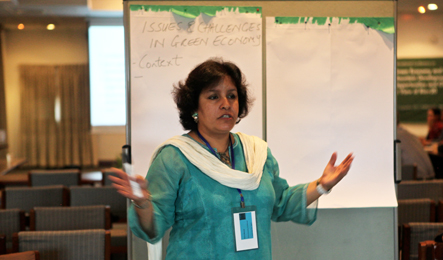 |
| Sara Ahmad, IDRC, chaired a working group that strove to identify issues and challenges in promoting a green economy in mountain regions. |
|
 |
 |
 |
 |
|
 |
 |
 |
 |
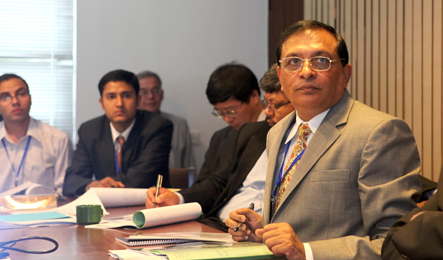 |
| Eklabya Sharma (R), ICIMOD, chaired a working group that identified principles and actions that demand priority in the global green economy and Rio+20. |
|
 |
 |
 |
 |
|
 |
 |
 |
 |
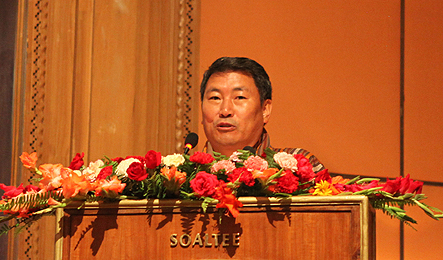 |
Pema Gyamtsho, Ministry for Agriculture and Forests, Bhutan, encouraged participants to have "green minds, green hands and green hearts."
|
|
 |
 |
 |
 |
|
 |
 |
 |
 |
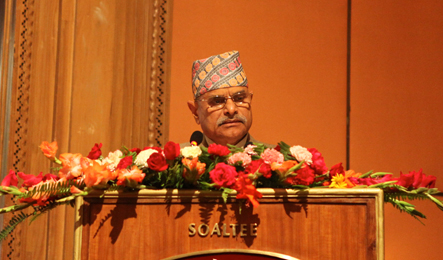 |
| Ram Baran Yadav, President, Nepal, lit panas to inaugurate the conference, then presented a speech. |
|
 |
 |
 |
 |
|
 |
 |
 |
 |
On Wednesday morning, Andreas Schild, ICIMOD, introduced a session to present the key messages and recommendations from the two-day workshop to the Conference.
The workshop summary was followed by a panel discussion with key stakeholders from mountain regions and international agencies, chaired by Thomas Gass, Ambassador of Switzerland to Nepal. Challenging participants to clarify their expectations of what would change if mountains were reflected in Rio+20 outcomes, MF Farooqui, Ministry of Environment and Forests, India, proposed that the message from mountain community should be that the “world has a problem, and we have a solution.” Olman Serrano, Mountain Partnership Secretariat, highlighted some of the Secretariat’s activities and the importance of influencing the Rio+20 Co-Chairs’ “compilation document” by providing the inputs of this workshop.
On Wednesday afternoon, Andreas Schild, ICIMOD, introduced the session on the way forward for sustainable mountain development and Rio+20. Mohammad Malikyar, National Environmental Protection Agency, Afghanistan, noted his country’s willingness to support the recommendations of this Conference. Sara Ahmed, IDRC, discussed the role of cross-regional collaborations as well interdisciplinary partnerships. In closing the conference, Mathias Jurek, UNEP, urged for the mainstreaming of the outcomes of the Conference in the Rio+20 preparatory process. The meeting closed at 4.45 pm.
Visit the full web coverage for Wednesday 7 September 2011.
Coming soon: Download the ENB summary of the meeting in HTML or PDF format.
|
|
 |
 |
 |
 |
 |
 |
 |
 |
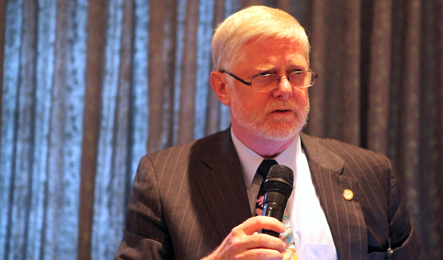 |
| Langston James "Kimo" Goree VI, IISD RS, suggested ways to bring the mountain agenda to Rio+20. |
|
 |
 |
 |
 |
|
 |
 |
 |
 |
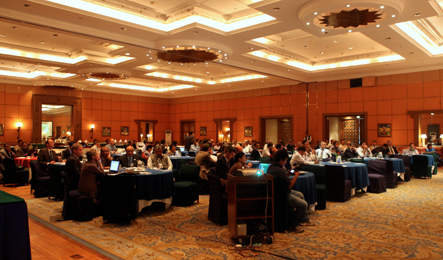 |
| The conference room at the Soaltee Hotel. |
|
 |
 |
 |
 |
|
 |
 |
 |
 |
 |
| Ceiling in the Bhutan Pavilion at the ICIMOD headquarters. |
|
 |
 |
 |
 |
|
|
|
|
|
|
|
|